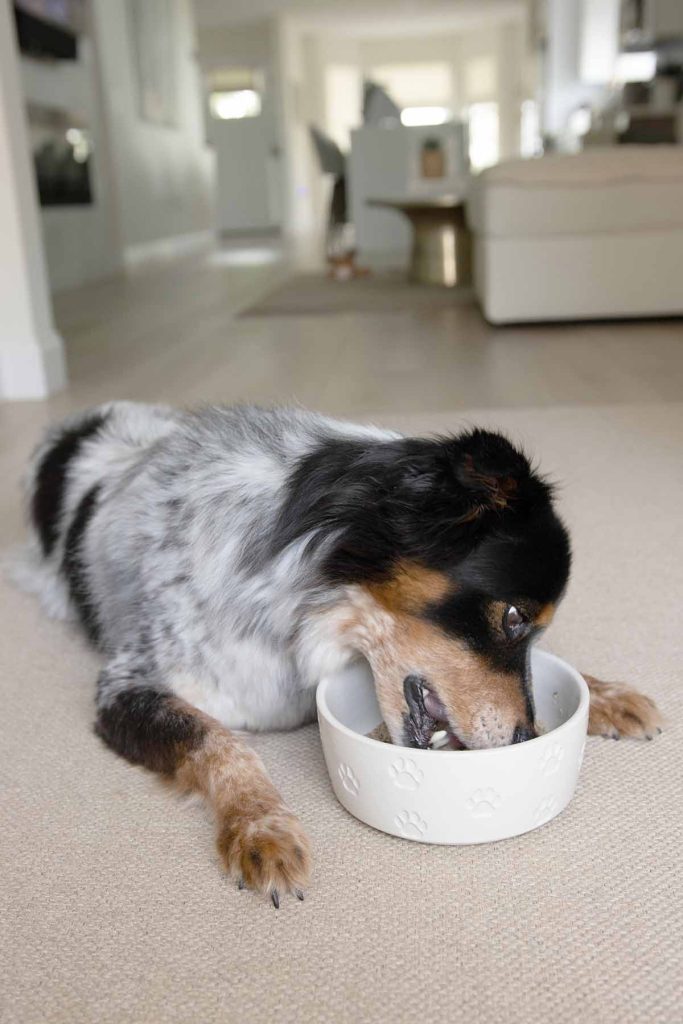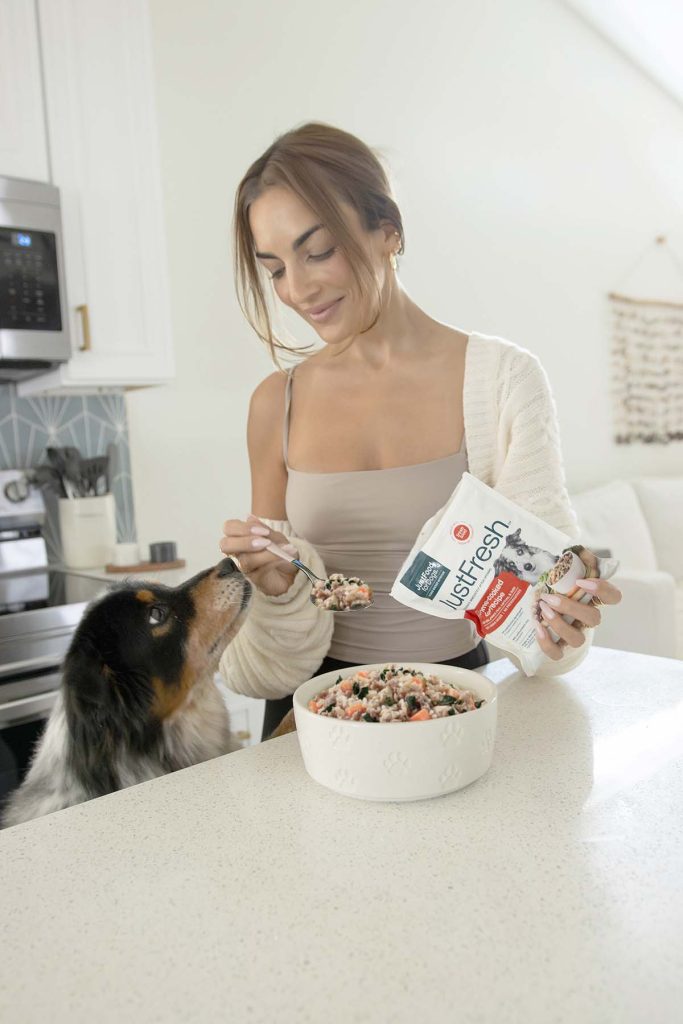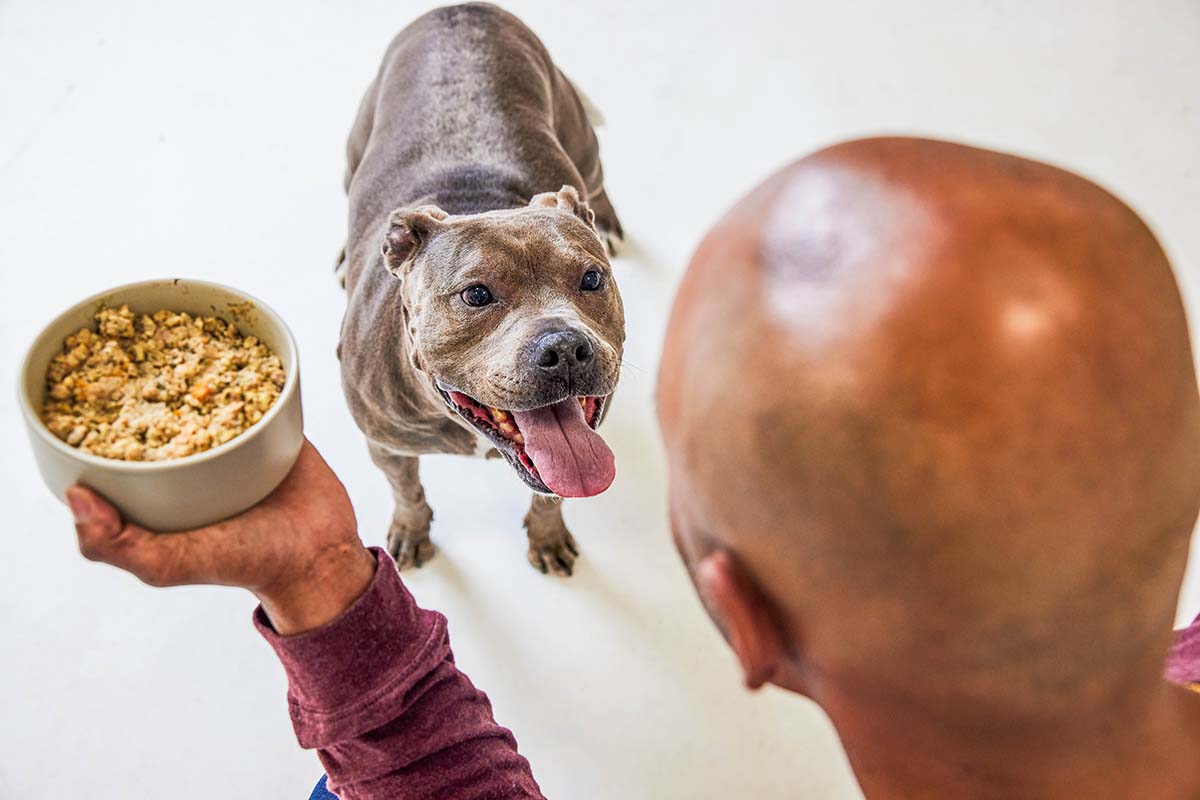What is the best feeding time for dogs? Mealtimes tend to be a favorite occasion for most dogs. While feeding your pup might seem like a simple task, the “when” and “how” can make a big difference in their health, energy level, and behavior.
Whether you just adopted a new puppy, have an energetic adult dog, or are managing a senior dog’s needs, understanding your dog’s feeding schedule is key to their overall wellness. Here’s what dog owners need to know about how often to feed their pet and why a consistent feeding routine matters.
How many times a day should I feed my dog?

Your dog’s answer to this question is likely different than what the experts would say. While your dog may think they are starving all day long, your pup doesn’t need frequent feedings.
So, how often should you fill their food bowl with kibble? The answer depends on several factors such as their life stage, size, and lifestyle.
Most adult dogs (i.e., from about 6 months of age to 7 years) should be fed once in the morning and once in the evening. Twice daily feeding helps keep energy levels steady. It also prevents hunger-related begging and scavenging, and reduces the risk of bloat, especially in large-breed dogs.
Athletic dogs, such as those involved in competitive sports, may need three meals a day, depending on their energy expenditure. Consult with your veterinarian, or DVM, to determine the best schedule for your active pup.
Puppies, on the other hand, grow rapidly and need more frequent meals to fuel their bodies and brains. Most veterinarians recommend feeding puppies under 4 months of age three to four meals per day and feeding puppies 4 to 6 months of age three meals per day.
Feeding puppies a dog food specifically designed for their life stage is critical to ensure their nutritional needs are met. Puppy food is specially formulated with the extra calories, protein, vitamins, and minerals puppies need to support their rapid growth and development.
Senior dogs may still do well with two meals a day. Some, however, may do better with several small meals fed more often. If your older pup has health problems, such as diabetes or kidney issues, your veterinarian may suggest three small meals per day.
Feeding cheat sheet
| Puppies < 4 months old | 3-4 meals/day |
| Puppies 4-6 months old | 3 meals/day |
| Adult dogs | 2 meals/day |
| Athletic dogs | 3 meals/day |
| Senior dogs | 2 meals/day, or 3 small meals/day |
Should my dog’s feeding schedule change as they age?

Your dog’s feeding schedule should change as they get older. This is because their nutritional needs and lifestyle change throughout each life stage. Puppies grow fast and burn a lot of energy, and their small stomachs can’t hold much food. This means they require several meals a day to maintain steady blood sugar levels and fuel healthy growth.
Adult dogs typically do well with twice-daily feeding to help prevent hunger-related behavior problems, and this schedule fits well into most pet parents’ daily routines.
Senior dogs may be less active and need fewer calories, or they may develop chronic conditions that require specialized diets or smaller, more frequent meals.
Should I leave food out for my dog?
Leaving dog food out for your pup, a practice known as free choice or free-feeding, may seem convenient. However, this is generally not the best way to feed your dog. In general, free-feeding may lead to:
- Overeating — When allowed free access to kibble, most dogs won’t regulate themselves and will consume more calories than they need. This can lead to obesity, which increases your pup’s risk for serious health issues such as cancer, diabetes, arthritis, and kidney disease.
- Spoiled or contaminated food — Pet food that sits out can become contaminated with bacteria or attract insects or rodents. Never leave out moist or canned food longer than 20 to 30 minutes because it can spoil quickly.
- Resource guarding — In multi-pet homes, free-feeding can trigger competition or guarding behaviors, especially if one pet hogs the bowl. In addition, pets who worry about getting their fair share may develop food-related anxiety issues.
- Inability to monitor eating habits — Measuring your dog’s meal portions and feeding them at a specific time allows you to determine how much they eat. Additionally, noticing changes in your dog’s food intake as soon as possible is important so you can seek veterinary care if necessary. If you free-feed your dog, you may not realize if they skip a meal, which could be a sign of illness.
Is it important to keep my dog on a feeding schedule?

Offering meals on a consistent feeding schedule builds a healthy routine and helps your dog feel more secure and satisfied. Dogs are creatures of habit, and knowing when to expect their next meal can help prevent anxiety.
A regular feeding frequency also helps your dog’s body get used to a routine digestion cycle. When your dog eats at the same time each day, they may also poop on a predictable schedule, which can reduce accidents.
To keep your dog on a consistent feeding schedule:
- Choose a set mealtime — Try to feed your dog at the same time every day. A little wiggle room is OK, but big changes can confuse your pup. Choose times that are convenient for you but not so spread out that your dog becomes too hungry. If your schedule changes often, set reminders or use an automatic feeder to help keep feeding times consistent.
- Measure your dog’s food — Eyeballing your dog’s meal portion can lead to over- or underfeeding your pup. Use a measuring cup or food scale to give your dog the right amount of food based on their weight, age, and activity level. Your vet can help you figure this out if you’re not sure.
- Set a time limit — Pick up your dog’s bowl after about 15 to 20 minutes, even if they aren’t finished. This teaches your pup to eat when pet food is offered and helps prevent picky eating or grazing.
Feeding your dog on a regular schedule tailored to their age, lifestyle, and health sets the stage for long-term wellness and a healthy life.
Need help choosing the right feeding schedule for your pup? Your veterinarian can help you determine the best feeding frequency and diet to fit your dog’s needs from puppyhood to their golden years.
This content is for informational use only and does not replace professional nutrition and/or medical advice, diagnosis, or treatment. It is not a substitute for and should not be relied upon for specific nutrition and/or medical recommendations. Please talk with your veterinarian about any questions or concerns.
